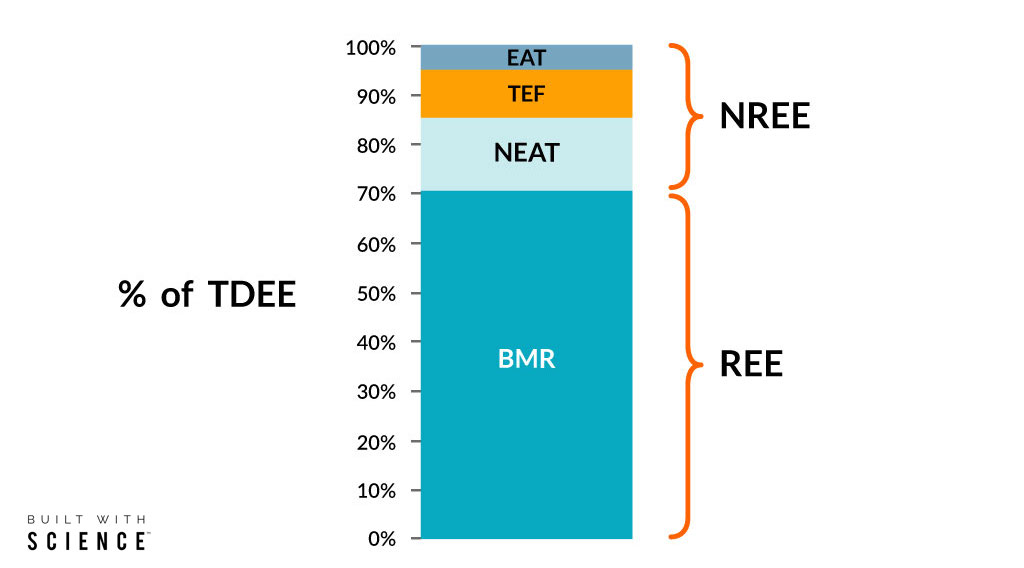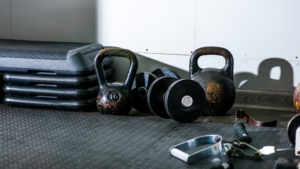Resting metabolic rate (RMR) constitutes approximately 60-75% of TDEE and includes sleeping metabolism, basal metabolism, and arousal metabolism. RMR is the number of calories a body needs at rest to perform basic functions such as the heart beating and keeping the brain functioning. This is by far the biggest part of the energy balance equation but is also the least variable, you can’t affect this number daily / weekly. However it will alter with weight loss, as mentioned later.
The thermic effect of feeding (TEF) constitutes approximately 10% of Total Daily Energy Expenditure (TDEE), the result of the energy being required in the processes of digesting, absorbing, and assimilating food nutrients. The magnitude of the TEF can vary a bit depending on both the quantity and type of food eaten. However, TEF is not a primary factor in weight management.
The physical activity part is broken into NEAT (non exercise activity thermogenesis) and EAT (exercise activity thermogenesis). This constitutes approximately 15-30% of TDEE. NEAT includes occupational and lifestyle activity (walking, fidgeting etc) and EAT is purposeful bouts of activity exercise (running, gym sessions etc). Physical activity is the most variable component of TDEE and can contribute the most to energy balance (and therefore weight loss). NEAT (being active throughout the day) is by far the largest component we have control of on a daily basis and therefore should always be the primary focus instead of trying to do more workouts and/or harder training sessions (EAT).
Practical application of energy balance
As mentioned for weight loss, creating a negative energy balance/calorie deficit is key. But the problem of simply dropping calories low straight away is this can affect things like mood, concentration, a reduction in physical performance both for training and also for staying active day to day. Plus long term low energy intake can also disrupt menstruation and reduce bone mineral density among other things.
The aim should be to gradually reduce calorie intake. It’s common to read that a 3500kcal reduction in total weekly calories (500kcal per day) is required to lose 1lb/0.5kg per week. Firstly this isn’t 100% accurate and secondly this one size fits all approach to nutrition can be problematic. For some people a 500kcal reduction per day could be fine and for others it could cause the above problems.
Reducing calories does not mean you have to track calories in an app and tracking calories doesn’t mean you are automatically going to be successful with weight loss. As much as it is important to understand what makes up the foods you commonly eat it’s not essential to track in an app.
Simply making changes to reduce energy intake by focussing on quick wins/low hanging fruit with your diet is a great place to focus on. For example
- Free pouring oils into salads or into pans for cooking can add a lot of calories into a dish. By switching to lemon for salads and buying new non-stick pans is an easy quick win.
- Grabbing handfuls of nuts as a healthy snack can easily take you way over the recommended 30g average serving size. Portioning out nuts into smaller containers and having alternative snacks with less energy like fruit is a simple swap.
- When increasing protein intake it’s common to have eggs for breakfast, if trying to hit 20-30g of protein per meal you might start eating 3-4 eggs. Switching to 2 whole eggs and 1-2 whites can reduce total calorie intake
- Reducing how often you drink alcohol is an obvious quick win.
- Pre making protein balls to freeze and having after a meal to satisfy a sweet tooth is a nice way to stop sugar cravings.
- Choosing multiple fat sources in a meal, like a salad with pine nuts, olive oil, avocado and seeds, as much as it sounds super healthy it’s easy to pile in the calories. Choose lemon and balsamic dressing and taking out some of those repeated fat sources is a nice way to take calories out of a meal. Note that I’m not saying low fat is the answer, this is simply an example.
- If we choose lean protein vs. extra lean, we may add an additional few hundred calories of fat to our menu each day without even knowing it.
In most cases, we wouldn’t really be able to tell the difference between meals with slightly fewer calories.
The key is to make some nutritional changes and sure you don’t feel like you are noticing any reduction in performance both physical or cognitive and make changes if you feel you have started on too high or low a calorie reduction.
Let’s look at other ways to create a healthy negative energy balance / energy deficit.
- Increase NEAT (non-exercise physical activity) by walking, taking the stairs or cycling on rest days.
- Control overall portion size, eat until satisfied and not full
- Learn to observe hunger. Try to recognise if you are truly hungry. Would you still want to eat if you ate something fairly simple/bland or is the sensation more driven by your heart or your head.
- Think about total weekly energy intake vs daily intake. It’s common to think you have blown your diet because of 1 bad day. The reality is the human body can easily manage daily fluctuations in energy intake and one bad day isn’t going to instantly mean fat gain. Even if a week was high in total energy, if you have a few weeks on track around that 1 higher week you will still be successful. Energy balance isn’t fixed into single days, it’s an average over time.
- Eat vegetables at every meal as they are nutrient-dense but low calorie and therefore filling.
- Sleep 7-9 hours each night, we all know how a bad night’s sleep can increase hunger and rescue activity.
- Stay consistent with habits to build a routine that works. You have to not think about nutrition as a diet and more about finding a way to eat sustainably over time. Because if you are successful, and you now weigh less you will have to learn to eat at a lower calorie intake (more on metabolic adaptation below)
- Focus on getting stronger and adding muscle rather than always thinking of burning calories in a session. (more on this below)
Metabolic adaptation is one thing you have to be aware of if you want to lose weight. Considering that BMR is the largest overall component of energy expenditure per day, if your overall body goes down so does that amount of energy required to sustain life, on top of this it takes more energy to move a heavier person around. As you lose weight you burn less energy at rest and in activity. Yes you will be fitter and be able to move more, train harder but most of our time we are fairly sedentary which makes it harder to maintain weight without consuming a lower energy intake. Therefore creating habits that you can stick with becomes really important as you can’t simply go back to your old diet and expect to keep weight off.
A final note on trying to “burn calories in training”. There is a finite amount of energy your body can burn in any given session. Calorie calculators on watches are not accurate (they can be around 30-50% overestimating calorie expenditure) so I suggest taking the physical data lightly. The human body is very complex and there is currently really no way to accurately measure energy expenditure outside of a laboratory setting. Which is why I say to focus on staying active throughout the day and think about getting strong vs always thinking of workouts about burning calories








